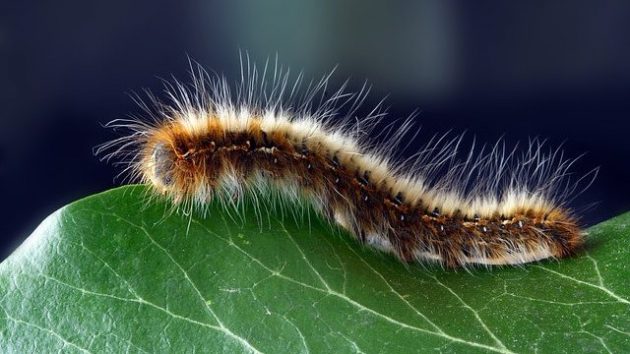Firuza (not her real name), a schoolteacher, awakes early, heads out to the fields and begins wading through cotton crops with other school workers and hospital employees to collect bollworms. All those workers should be on holiday, but instead, they were ordered by the head of their local district to pick the bollworms from cotton plants.
Bollworms are butterflies at the larval stage. They look like any normal garden caterpillar, but they are a menace to cotton-growers around the world. If not controlled, they can attack the buds and destroy the crops.
The variety found in Uzbekistan is yellow or green and can grow to around 5-6 centimeters. Each butterfly lays around 300 eggs. They attack not just the cotton buds but also the little sprouting shoots along the stem, which can put the plant out of commission indefinitely.
The workers pick them off by hand and collect the Bollworms in bottles. By midday, every worker has covered several lengths of crops, each 100 meters long, in temperatures that reach 105 degrees Fahrenheit. Their heads are protected only by their scarves.
Firuza says, “I got a call from the principal, and he told me that we needed to get into the fields. This happens every year. I don’t see why we should do farmers’ work.”
Health professionals from local hospitals and polyclinics and dispensaries in Kokand are “also press-ganged into this painful, exhausting work”.
“We take off our white coats and become agronomists and crop sanitation workers. I don’t really know anything about the bollworms, but they make us pick them,” a woman named Aziza said. “Before lunch you can gather about 20 or 30 of them. But these bollworms are mostly active at night, so we’re here for nothing, just wasting time.”
It is estimated that thousands of government employees from just the areas of Ferghana, Namangan and Andijan are sent out into the cotton fields to perform these daunting tasks.
The Berlin-based Uzbek-German Forum for Human Rights estimated in a report published last August that around 500,000 people were forced to weed cotton fields over a five-month period last year.
According to a farmer in the Shakhrikhon district of Andijan region, the agriculture minister himself gave instructions that the caterpillars be picked by hand. Using pesticides can have adverse effects, such as giving rise to secondary pests and damaging the crops. In the West, growers try, when possible, to use what are known as cultural methods, which entail carefully choosing the best time and methods for irrigation, plowing and harvesting. The bollworms began to appear this year in late July and have already ravaged multiple cotton fields, one farmer called Muhammadsodik told EurasiaNet.org. Rapid fluctuations in temperature can compound the problem.
Muhammadsodik explained that he bought insecticide that would cover 15,000 square meters per liter after it is diluted in water. Covering just one square mile will cost him $10. “I didn’t buy a very expensive pesticide. There are types that can cost farmers 500,000 sum ($83) per hectare (10,000 square meters). That is very expensive and can ruin a farmer.”
“According to NGO reports, regional production quotas are enforced by local authorities who achieve compliance through appeals to the national good, but also through threats related to the termination of employment, heavy fines, debt bondage, asset confiscation and police intimidation,” according to the report commissioned by the Australia-based Walk Free Foundation. Uzbekistan is in the top-five spot in the 2016 Global Slavery Index. In proportion to the size of its population, Uzbekistan has the second greatest number of “slave laborers” in the world per capita.







Freedom United is interested in hearing from our community and welcomes relevant, informed comments, advice, and insights that advance the conversation around our campaigns and advocacy. We value inclusivity and respect within our community. To be approved, your comments should be civil.